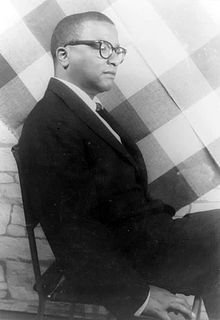Billy Strayhorn

William "Billy" Strayhorn (born November 29, 1915 in Dayton , Ohio , † May 31, 1967 in New York City , New York ) was an American jazz musician .
Live and act
Billy Strayhorn was a member, arranger and composer in Duke Ellington's orchestra from 1939 until his death . Strayhorn had a classical education during grade and high school, was considered a child prodigy and played the piano , which he financed himself with strange jobs. He wrote a musical unsuccessfully during school and turned more to jazz after listening to Art Tatum and Teddy Wilson . He enriched jazz with instrumental arrangements, the sophistication of which was rarely found in jazz until then. This makes him one of the most important arrangers in jazz. It was only later that it became known that his part of Ellington's music was wider and more complex than originally thought.
Strayhorn was doing odd jobs with his combo Mad Hatters when Ellington heard him in Pittsburgh and hired him on the spot, saying that he had no specific job for him, that he should do whatever he liked. Ellington and Strayhorn had a lifelong close friendship. Occasionally, Strayhorn even took on Ellington's part of the pianist on recordings. Strayhorn's and Ellington's duets on piano are also famous. Tonk z. B. is a funny, modern and very dynamic piece that both of them played often.
On several occasions Strayhorn was listed as a co-author with Ellington / Strahorn ("Day Dream," "Something to Live For") on the other hand, their collaboration was only noted under Ellington's name ("Satin Doll," "Sugar Hill Penthouse," "C- Jam Blues ") and Strayhorn's compositions were copyrighted under Ellington's name or not at all. It is noted on Ellington's suites. Strayhorn was formative for the sound of the Ellington Orchestra . The composition, text and arrangement of the most famous piece and the signature melody of the orchestra Take the “A” Train come from Strayhorn and not - as is often wrongly assumed - from Ellington. Other well-known compositions by Strayhorn are Chelsea Bridge , Lotus Blossom and Lush Life , as well as Snibor . He was occasionally heard as a pianist with Ellington ( Blues in Orbit ) and also released several records under his own name.
Strayhorn is known for his classics "Lotus Blossom," "Lush Life," "Rain Check," "A Flower Is a Lovesome Thing," and "Mid-Riff." And while these are tailored to Ellington's musical language, they mostly have their own bittersweet tone, and his larger works have a coordinated and classically influenced structure, unlike Ellington's.
He smoked and consumed alcohol and developed esophageal cancer. Immediately after his death, the Duke Ellington Orchestra recorded the tribute album ... And His Mother Called Him Bill . It contains Strayhorn's last composition Blood Count in the moving interpretation by Johnny Hodges . Little is known that Billy Strayhorn was openly gay at a time when it was a criminal fact. However, in an intolerant time and environment, he hardly stepped into the limelight personally, but mostly remained in the shadow of Duke Ellington. He found this condition partly satisfactory, partly frustrating, and his homosexuality meant additional stress. In 1968, a year after his death, Billy Strayhorn received the Grammy Trustees Award from the National Academy of Recording Arts and Sciences (NARAS) for his achievements in music.
literature
- James Lincoln Collier : Duke Ellington, Genius des Jazz, Hannibal, Vienna, 1989, Knaur paperback 1990 (English original "Duke Ellington", Oxford University Press 1987)
- David Hajdu: Lush Life: A Biography of Billy Strayhorn , Farrar, Straus, Giroux, New York 1996. ISBN 0-374-19438-6 .
- David Hajdu A jazz of their own , Vanity Fair, May 1999 (Ellington – Strayhorn relationship)
Web links
- Hans-Jürgen Schaal: child prodigy and dandy
- Billy Strayhorn: Lush Life on PBS , Independent Lens
- Billy Strayhorn: Portrait Of A Silk Thread
- Billy Strayhorn on Glbtq Encyclopaedia
- Billy Strayhorn at Discogs (English)
Individual evidence
| personal data | |
|---|---|
| SURNAME | Strayhorn, Billy |
| ALTERNATIVE NAMES | Strayhorn, William |
| BRIEF DESCRIPTION | American jazz musician |
| DATE OF BIRTH | November 29, 1915 |
| PLACE OF BIRTH | Dayton (Ohio) |
| DATE OF DEATH | May 31, 1967 |
| Place of death | New York City |